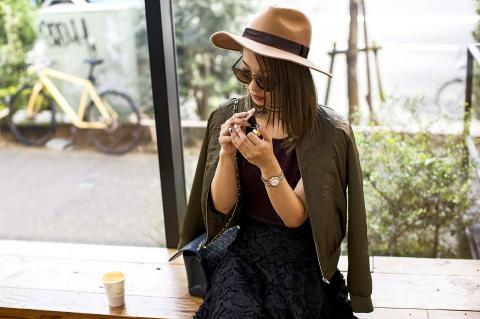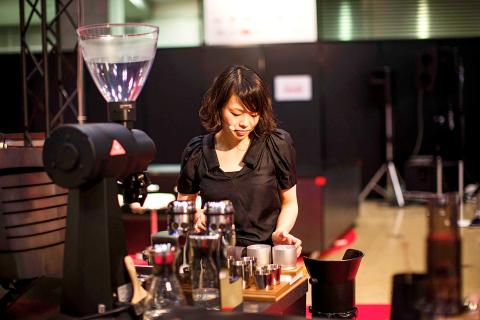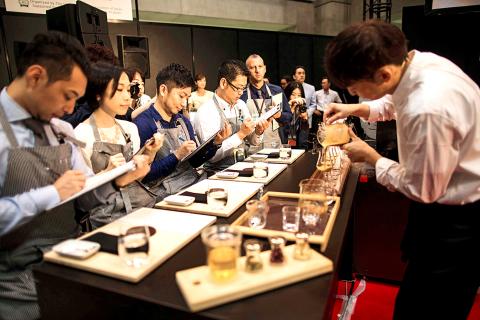Need a pick-me-up?
Try a lychee-flavored coffee infused with jasmine, or a “Chardonnay” espresso served in a wine glass — whatever your taste, Japan’s swashbuckling baristas are bringing some serious sex appeal to the drink.
In a country famous for its tea, the Japanese are increasingly turning to coffee as a quick-fix to help ease the daily grind. Hipster cafes are popping up everywhere, offering exquisitely curated beverages to satisfy even the fussiest of caffeine addicts.

Photo: AFP
Japan imports more than 430,000 tonnes of coffee a year — behind only the US and Germany — and boasts some of the world’s top baristas.
“The fact that tea culture already existed in Japan has helped cultivate an appreciation for coffee as a luxury item,” Miki Suzuki said after recently being crowned Japan’s champion barista.
“Japanese people have an extremely sensitive palate so they can appreciate subtle differences in flavor,” the 32-year-old said.

Photo: AFP
Suzuki impressed judges with a nitrogen-charged beverage — a technique often used by craft beer breweries to get a rich froth — which also had delicate citrus tones. For added serving style she decanted it into champagne flutes.
“Actually I didn’t even like coffee at first. Now my goal is to become the first female barista to win the world title,” she said.
Japan has a fine pedigree at the World Barista Championship and Suzuki looks to emulate 2014 winner Hidenori Izaki at the competition in Seoul next year, and go one better than Yoshikazu Iwase, this year’s runner-up.

Photo: AFP
Along with the likes of Suzuki and three-time national runner-up Takayuki Ishitani, their creativity and panache have made coffee-making cool.
“With a flick of the wrist here and a little bit of flair, baristas are making coffee sexy,” Ishitani said, adding: “It’s part of a barista’s job to enchant the customer and be a bit of a smooth operator, like a bartender. The performance is part of creating an atmosphere to please the customer.”
Ishitani whipped up a bubbling potion mixed with dry ice, fragrant herbs and orange honey at the Japan Barista Championship, but said he is on a “never-ending quest” for the perfect cup of coffee.
“It’s all about perseverance,” he added between pouring frothy cappuccinos at a trendy surf shop in Tokyo’s Daikanyama district. “Japanese people pay meticulous attention to detail. You’re not competing against other baristas, the battle is against yourself.”
The first documented evidence of tea in Japan dates back to the ninth century, when Buddhist monks brought it from China.
However, coffee only became popular in Japan after World War II, when the country resumed imports.
Starbucks now peddles its wares in more than 1,000 stores in Japan, while bottled and canned coffee sold in vending machines or convenience stores have long been a cheap favorite of the busy salaryman.
Despite that serious roasters turn their noses up at Starbucks, Japan has come a long way since the smoke-filled dives of the 1980s bubble era, which served coffee with antiquated percolators — though many still survive.
Coffee sales have long outstripped those of green tea and hip new hangouts with latte artists sprouting up in Tokyo and across Japan could easily be mistaken for New York or London.
“Definitely there is an intense interest in the minutia of coffee-making in Japan,” said Scott Conary, one of the judges at the Japan Barista Championship.
“You’re seeing more cafes with better skills and better coffee.”
While Japan’s highly ritualized tea ceremony is increasingly seen as a remnant of a bygone age, Ishitani does not take his art too seriously.
“I don’t think it’s necessary to drink coffee as reverently as we do tea,” he said. “Just knock it back — it’s really something that’s there to help the conversation flow.”

Intel Corp chief executive officer Lip-Bu Tan (陳立武) is expected to meet with Taiwanese suppliers next month in conjunction with the opening of the Computex Taipei trade show, supply chain sources said on Monday. The visit, the first for Tan to Taiwan since assuming his new post last month, would be aimed at enhancing Intel’s ties with suppliers in Taiwan as he attempts to help turn around the struggling US chipmaker, the sources said. Tan is to hold a banquet to celebrate Intel’s 40-year presence in Taiwan before Computex opens on May 20 and invite dozens of Taiwanese suppliers to exchange views

Application-specific integrated circuit designer Faraday Technology Corp (智原) yesterday said that although revenue this quarter would decline 30 percent from last quarter, it retained its full-year forecast of revenue growth of 100 percent. The company attributed the quarterly drop to a slowdown in customers’ production of chips using Faraday’s advanced packaging technology. The company is still confident about its revenue growth this year, given its strong “design-win” — or the projects it won to help customers design their chips, Faraday president Steve Wang (王國雍) told an online earnings conference. “The design-win this year is better than we expected. We believe we will win

Chizuko Kimura has become the first female sushi chef in the world to win a Michelin star, fulfilling a promise she made to her dying husband to continue his legacy. The 54-year-old Japanese chef regained the Michelin star her late husband, Shunei Kimura, won three years ago for their Sushi Shunei restaurant in Paris. For Shunei Kimura, the star was a dream come true. However, the joy was short-lived. He died from cancer just three months later in June 2022. He was 65. The following year, the restaurant in the heart of Montmartre lost its star rating. Chizuko Kimura insisted that the new star is still down

While China’s leaders use their economic and political might to fight US President Donald Trump’s trade war “to the end,” its army of social media soldiers are embarking on a more humorous campaign online. Trump’s tariff blitz has seen Washington and Beijing impose eye-watering duties on imports from the other, fanning a standoff between the economic superpowers that has sparked global recession fears and sent markets into a tailspin. Trump says his policy is a response to years of being “ripped off” by other countries and aims to bring manufacturing to the US, forcing companies to employ US workers. However, China’s online warriors